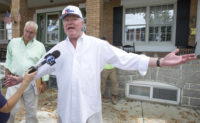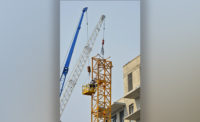Building trades officials and employees embezzled millions of dollars in recent years, raiding the bank accounts of their locals to pay for trips to Las Vegas, lavish jewelry, luxury cars, home renovations and even a new puppy, U.S. Labor Dept. records show.
Many of the cases involve extravagant spending, with lax oversight and poor financial controls enabling some officials and employees at union locals to supplement relatively modest on-the-book salaries.
The embezzlement charges federal prosecutors leveled at six officials and others affiliated with an IBEW local in Philadelphia are the latest in a series of similar cases involving building trades unions since the start of 2018, according to the federal Office of Labor-Management Standards.
Prosecutors charged or won convictions of 36 building trades officials or employees, from the chief of staff in the headquarters of one of the nation’s largest construction unions down to an elderly bookkeeper in a West Virginia local. All were sentenced or pled guilty during 2018 and the first few weeks of 2019, federal records indicate.
Many of the cases involved extravagant spending, with lax oversight and poor financial controls enabling local union officials and employees to supplement relatively modest on-the-book salaries by dipping into members’ dues and funds set aside for apprenticeship training, experts on fraud prevention say.
Embezzlement by the leaders of union locals and their staff has been an endemic problem for years now, records indicate.
“This is a black eye for the unions,” said Peter Henning, a law professor at Wayne State University in Detroit. “It’s that betrayal of trust.”
Home Repairs, Pets and Cadillacs
Federal prosecutors recently hit John Dougherty, a top official in Local 98 of the International Brotherhood of Electrical Workers in Philadelphia, as well as six others affiliated with the local, with a 116-count indictment. They charged the co-defendants with stealing $600,000 from the union and its apprenticeship training program, according to the federal indictment.
The money went to pay for work on property Dougherty owns, to pay union employees to run personal errands, as well as for items ranging from baby wipes to Starbucks Frappuccinos, federal court records show. Dougherty's official salary was reportedly $70,000.
There were other much less-well- publicized prosecutions.
Raymond Ventrone, the former business manager of a boilermakers local in Pittsburgh, was sentenced last year to 41 months in prison and ordered to pay more than $3 million in restitution after an epic, five-year white-collar crime spree.
As business manager of Local 154, Ventrone blew more $1,075,000 at Best Buy and the Apple Store, $570,000 at luxury French retailer Louis Vuitton, and tens of thousands to indulge his passion for music. This included $38,000 spent at Drum World on drums, percussion instruments and musical accessories. All were kept “under lock and key” at the local and “unavailable and off limits to Local 154 members,” according to a press statement from U. S. Attorney Scott Brady’s office.
There was also $10,623.95 spent on Coco Lunette eye glasses, $26,000 on concrete work at his house and a $9,000 kitchen remodel. The judge overseeing the case also noted Ventrone’s seven Cadillacs.
Exception to The Rule
And while most of the cases involve officials at union locals, sometimes with a handful of staff, Roderick Bennett is a prominent exception.
A former chief of staff for the 580,000-member Laborers International Union of North America, Bennett was charged with three counts of theft and two counts of health care fraud.
Over three years, Bennett rang up $170,000 in charges on his union credit card, paying for trips to Las Vegas, New York and Orlando, a puppy, “lavish jewelry” and “gold-flecked makeup,” private school tuition, and $33,000 in hotel and restaurant charges in Washington.
A fair number of cases, though, involve lower level staff at union locals. One of them was Joan Matthews, a 70-something bookkeeper who was charged last year with embezzling more than $100,000 from the Charleston Building and Construction Trades Council in West Virginia.
Matthews drew and cashed unauthorized union checks and use the money to pay credit card bills and to pay off charges she had rung up on the building council’s credit card.
Need for Stricter Oversight
As relatively small organizations with lots of ready cash pouring in from members’ dues, union locals are particularly vulnerable to embezzlement by top officials and employees, noted Robert Brown, founder partner of the CPA Solution, a Bangor, Maine-based fraud prevention and detection firm.
But Brown said even a few simple steps could put a dent the number of embezzlement cases.
A top priority should be insisting that the same person who is authorized to write checks for the union isn’t also doing the bank reconciliation.
Even in a small local with one or two staffers, someone else, such as a board member, needs to review the images of the checks cashed at the bank, he said.
In many cases, rogue employees are writing checks to themselves or to a relative and then hiding it in the books. “If I am writing checks to myself, it would not take very long to find out,” Brown said. “’What is this check to your wife?’ Tracking who we are writing checks to will cut down on a ton of these.”
Still, in small organizations, it can be difficult to point the finger, especially if the person with their hand in the cash register is a supervisor.
“The last thing people want to do is point the finger,” Brown said. “It could be the last conversation – generally they (the embezzlers) are someone in power.”
Wayne State University’s Henning agrees it may be difficult for employees of the local to provide this needed oversight, or to play the role of the whistle blower, especially if it’s the head of the local who is playing fast and loose with union funds.
“A lot of these are (union) presidents,” Henning said. “I guess if it’s the president of the local, no one is going to ask too many questions.”
Henning contends the parent union organizations of the various locals need to step up their oversight of their locals and provide them with some accounting tools
“Part of it may just be there is no real oversight from the national union,” Henning said. “Nothing scares an embezzler more than an audit.”
And at a time when unions are shrinking, embezzlement scandals are the last thing the labor movement needs.
“It can be absolutely devastating if it goes on for a period of time,” Henning said.






